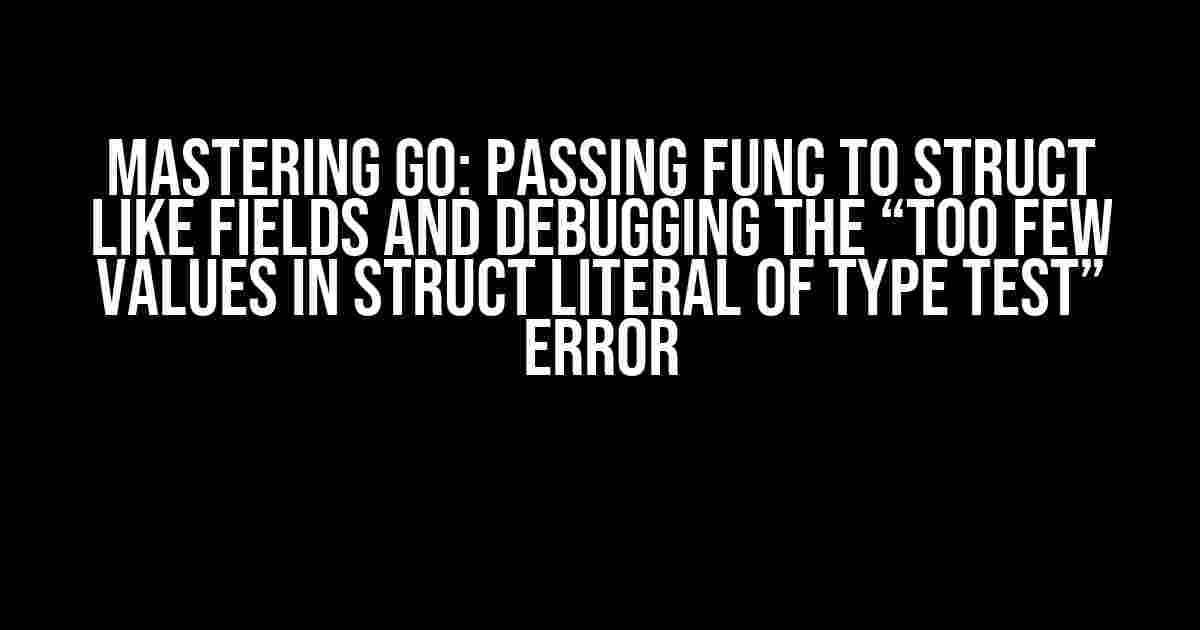Are you struggling to pass functions as struct fields in Go, only to be met with the frustrating “too few values in struct literal of type Test” error? Worry no more! In this comprehensive guide, we’ll delve into the world of Go structs, functions, and error handling, providing you with the knowledge and skills to overcome this common obstacle.
Understanding Go Structs and Fields
Before we dive into the world of functions as struct fields, let’s take a step back and understand the basics of Go structs. In Go, a struct is a collection of fields, which can be of various data types, including primitive types, pointers, and even functions.
type MyStruct struct {
name string
age int
sayHello func() string
}In the above example, we define a struct `MyStruct` with three fields: `name` of type `string`, `age` of type `int`, and `sayHello` of type `func() string`. The `sayHello` field is where things get interesting, as it allows us to store a function as a struct field.
Passing Functions as Struct Fields
To pass a function as a struct field, we need to create a function that matches the type of the struct field. In our previous example, the `sayHello` field expects a function that takes no arguments and returns a `string`. Let’s create such a function:
func helloWorld() string {
return "Hello, World!"
}Now, let’s create an instance of our `MyStruct` and pass the `helloWorld` function as an argument:
myInstance := MyStruct{
name: "John Doe",
age: 30,
sayHello: helloWorld,
}By doing so, we’ve successfully passed a function as a struct field! You can now access the `sayHello` function like any other struct field:
fmt.Println(myInstance.sayHello()) // Output: Hello, World!The “too few values in struct literal of type Test” Error
So, what happens when you try to pass a function as a struct field, but the function doesn’t match the expected type? Let’s create a new struct and a new function to demonstrate this:
type Test struct {
hello func(int) string
}
func helloWorld() string {
return "Hello, World!"
}Now, let’s try to create an instance of the `Test` struct and pass the `helloWorld` function as an argument:
testInstance := Test{
hello: helloWorld, // Error: too few values in struct literal of type Test
}Ouch! The Go compiler is complaining about the “too few values in struct literal of type Test” error. This is because the `helloWorld` function doesn’t match the expected type of the `hello` field, which is `func(int) string`. The `helloWorld` function doesn’t take any arguments, whereas the `hello` field expects a function that takes an `int` argument.
Debugging the Error
So, how do we fix this error? The solution is simple: we need to create a function that matches the expected type of the `hello` field. Let’s create a new function that takes an `int` argument:
func helloName(n int) string {
return fmt.Sprintf("Hello, #%d!", n)
}Now, let’s try to create an instance of the `Test` struct again, passing the `helloName` function as an argument:
testInstance := Test{
hello: helloName,
}Voilà! The error has disappeared, and we’ve successfully passed a function as a struct field that matches the expected type.
Common Scenarios and Solutions
In this section, we’ll explore some common scenarios where you might encounter the “too few values in struct literal of type Test” error and provide solutions to overcome them.
Scenario 1: Mismatched Function Signatures
When the function you’re trying to pass as a struct field has a different signature than the expected type, you’ll encounter this error.
type Test struct {
hello func(string) string
}
func helloWorld() string {
return "Hello, World!"
}Solution: Ensure the function signature matches the expected type, or modify the function to match the expected type.
Scenario 2: Missing Function Arguments
When the function you’re trying to pass as a struct field is missing required arguments, you’ll encounter this error.
type Test struct {
hello func(int, string) string
}
func helloName(n int) string {
return fmt.Sprintf("Hello, #%d!", n)
}Solution: Add the missing arguments to the function or modify the function to match the expected type.
Scenario 3: Incorrect Function Return Type
When the function you’re trying to pass as a struct field has an incorrect return type, you’ll encounter this error.
type Test struct {
hello func(int) string
}
func helloName(n int) int {
return n * 2
}Solution: Ensure the function return type matches the expected type, or modify the function to match the expected type.
Best Practices and Conclusion
When working with functions as struct fields in Go, it’s essential to keep the following best practices in mind:
- Ensure the function signature matches the expected type.
- Verify the function arguments and return types match the expected type.
- Test your code thoroughly to catch any potential errors.
In this comprehensive guide, we’ve delved into the world of Go structs, functions, and error handling. By following the instructions and explanations provided, you should now be equipped to pass functions as struct fields like a pro and debug the “too few values in struct literal of type Test” error with confidence. Happy coding!
| Scenario | Error | Solution |
|---|---|---|
| Mismatched function signature | “too few values in struct literal of type Test” | Ensure function signature matches expected type |
| Missing function arguments | “too few values in struct literal of type Test” | Add missing arguments to function or modify to match expected type |
| Incorrect function return type | “too few values in struct literal of type Test” | Ensure function return type matches expected type |
Remember, practice makes perfect! Try experimenting with different scenarios and solutions to solidify your understanding of passing functions as struct fields in Go.
Here are 5 Questions and Answers about “Go Pass Func to Struct like fields, Error “too few values in struct literal of type Test” :
Frequently Asked Question
Get the answers to the most commonly asked questions about passing functions to structs in Go and resolve the “too few values in struct literal of type Test” error!
Q1: What happens when I try to pass a function to a struct in Go?
When you try to pass a function to a struct in Go, you’re essentially trying to assign a function to a field of the struct. This can be tricky because functions are not values that can be directly assigned to struct fields. You need to create a field of type `func()` or a similar function type to hold the function value.
Q2: Why do I get the “too few values in struct literal of type Test” error?
This error occurs when you’re trying to create a struct literal with an incorrect number of values. In the case of passing functions to structs, this error can happen if you haven’t defined the correct number of fields in your struct or if you’re not providing the correct number of values when creating a struct literal.
Q3: How can I define a struct field to hold a function value?
To define a struct field that can hold a function value, you need to specify the type of the field as a function type. For example, if you want to hold a function that takes an `int` and returns a `string`, your struct field would be defined as `MyFunc func(int) string`. Then, you can assign a function value to this field when creating a struct literal.
Q4: Can I pass anonymous functions to struct fields?
Yes, you can pass anonymous functions to struct fields! Anonymous functions are functions that are defined without a name, and they can be passed as values to struct fields just like named functions. This can be useful when you need to create a simple function on the fly and pass it to a struct field.
Q5: Are there any best practices for passing functions to structs in Go?
Yes, there are best practices for passing functions to structs in Go! One important thing is to make sure you’re defining the correct function type for your struct field. Another best practice is to keep your functions simple and focused on a single task, so they’re easy to understand and use. Finally, consider using named functions instead of anonymous functions for better code readability.


